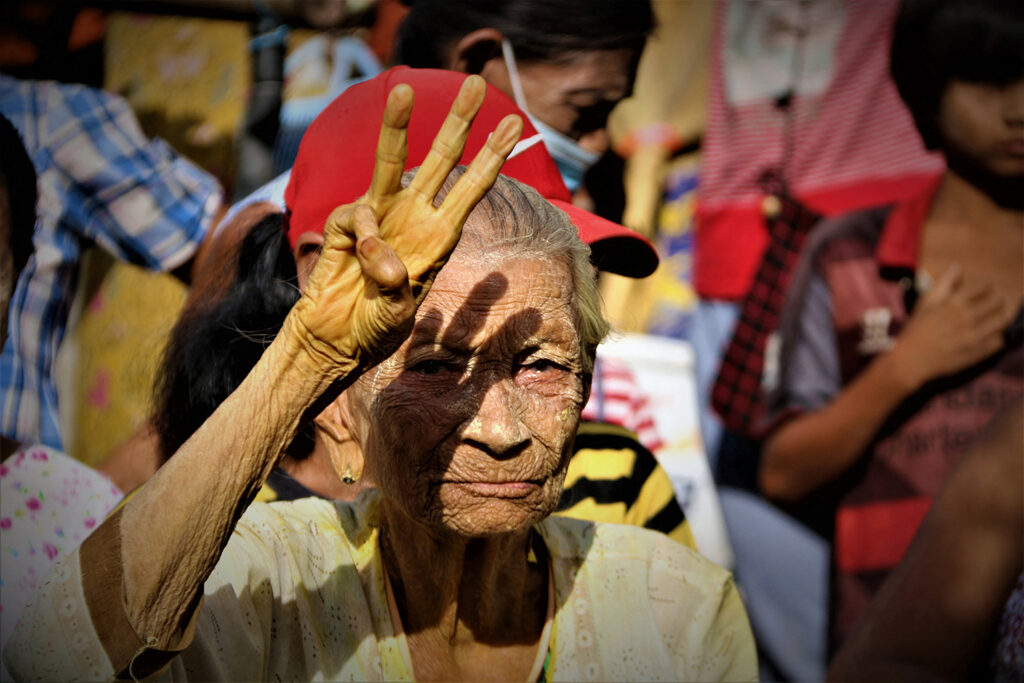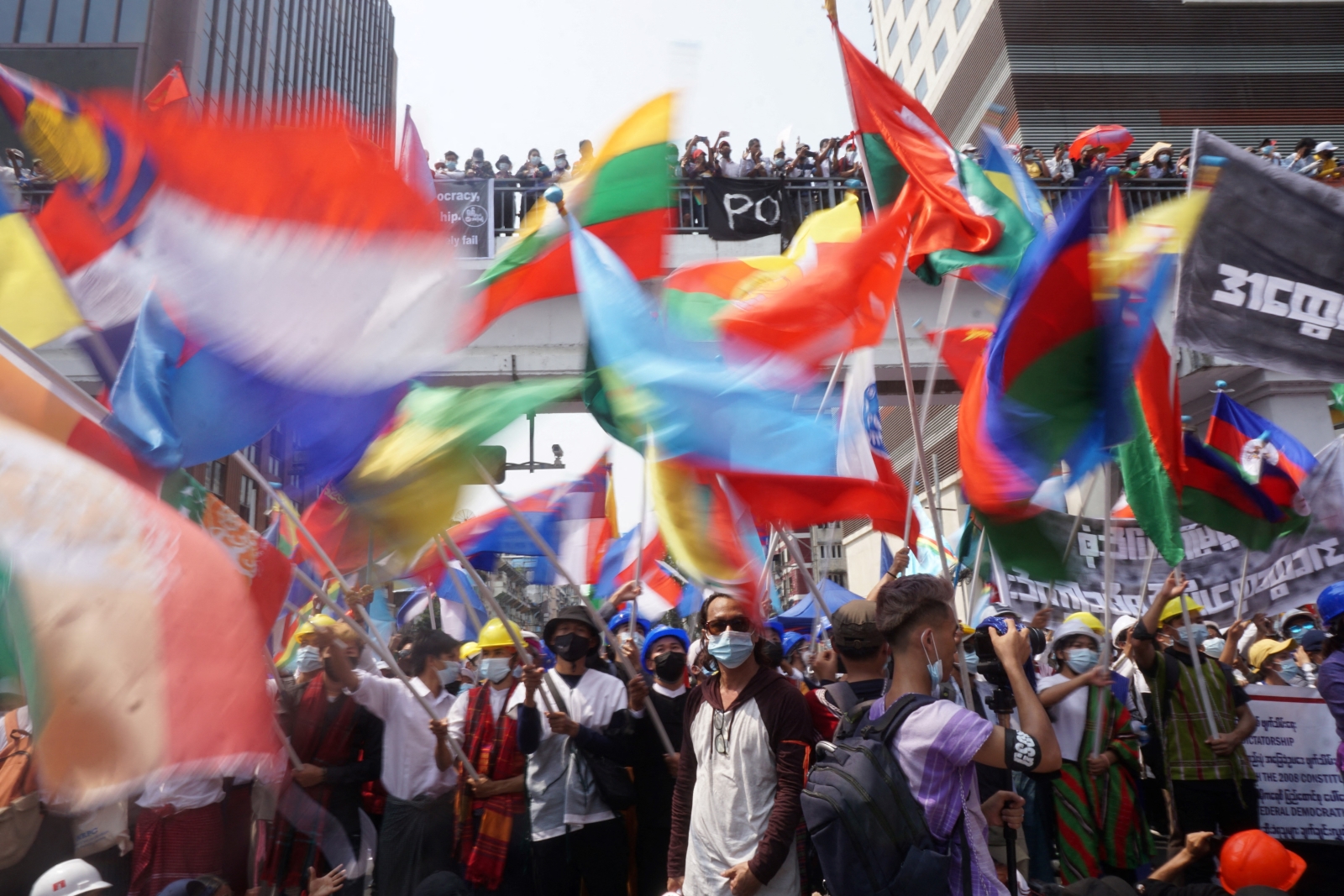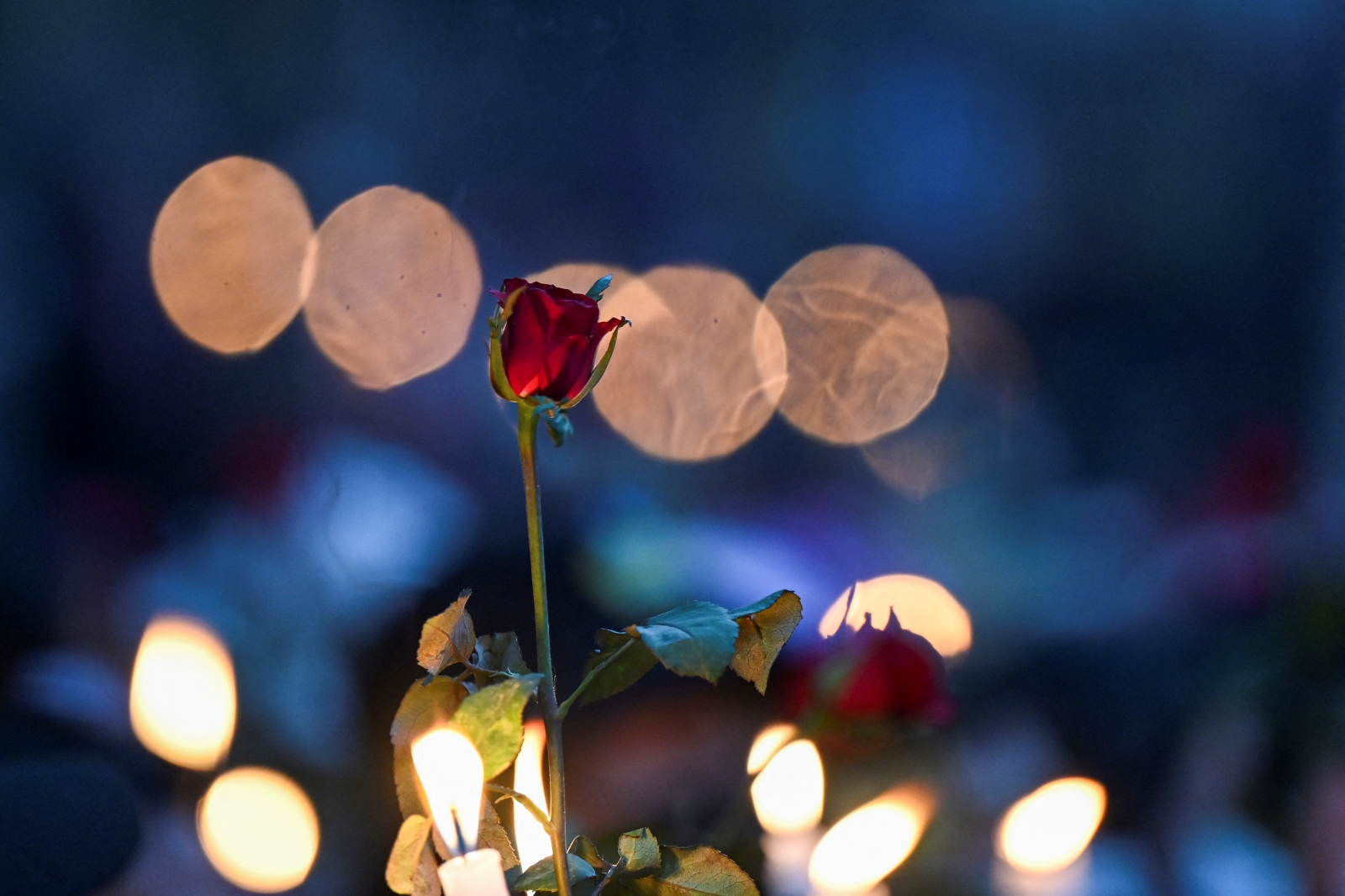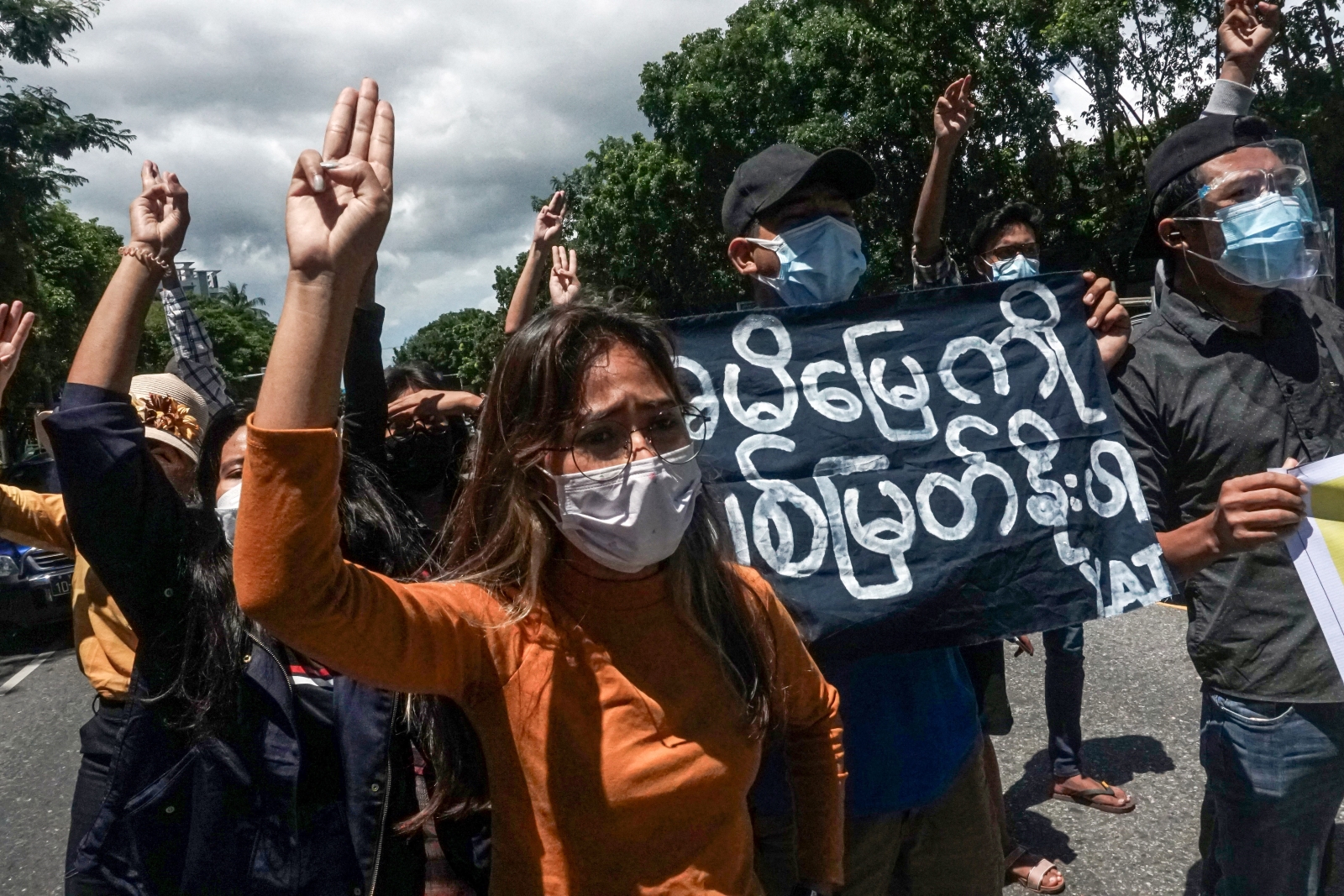The coup has inflicted all kinds of suffering on older people, ranging from fiery deaths in burning villages to grieving for sons and daughters killed in battle and living precariously without financial support.
By FRONTIER
“Two elderly people died in a fire set by the military because they were unable to escape”, ran one of dozens of similar news headlines over the last year. Each described a separate tragedy involving defenceless, older residents of villages mostly in Sagaing and Magway regions, where the military has waged a savage campaign of killings and arson.
Senior citizens are traditionally treated with respect and dignity in Myanmar, but their current plight has been overlooked by many. Instead, attention is mostly focused on youth who have seen their future ruined by the February 2021 coup and the subsequent turmoil.
Myanmar is a relatively young society, with about 52 percent of its population younger than 30, according to the latest census conducted in 2014. By contrast, 10 percent of a total population of about 51 million are 60 years or older.
Most of that older population live in poor rural areas, many of which have become war zones. During heavy fighting, it is often impossible for old people to flee marauding groups of soldiers. In March, Ko Than Hteik’s 72-year-old grandfather became yet another of the scores of elderly victims of military-set fires when troops raided his village in Sagaing Region’s Monywa Township. His grandfather was too old and infirm to escape the fire.
“We didn’t expect the military to set fire to the village as soon as they arrived. That’s why we fled, leaving our grandfather at home. He was one of three old people killed in the fire,” Than Hteik said.
Data compiled by the Assistance Association for Political Prisoners shows at least 268 people aged 60 or over, out of a total of 3,412, have been killed by the military in the more than two years since it seized power. The real figure is probably much higher, because the ages of about 800 victims are unknown.
In the worst atrocity committed by the junta so far, the aerial bombing this month of Pa Zi Gyi village in Sagaing Region’s Kantbalu Township, no less than 10 of the at least 170 people killed were elders, according to the parallel National Unity Government.
A generational divide
As well as the suffering its forces have inflicted on senior citizens in conflict zones, the military is also reviled by many for deaths from COVID-19 among the older generation during the collapse of the healthcare system soon after it seized power.
The junta severely underreported the deaths from the Delta wave of COVID-19 infections, which raged in Myanmar during the rainy season from June to September in 2021.
Using data from cemeteries and other sources, Frontier estimated that the true death toll could have been in the hundreds of thousands. Consistent with findings across the world during the pandemic, most of the victims would have been elderly.
While the outbreak was exacerbated by a mass walkout of staff from government hospitals as part of the Civil Disobedience Movement, as well as by a public boycott of vaccines offered by the junta, the regime also suppressed private efforts to help the sick and hoarded oxygen supplies.
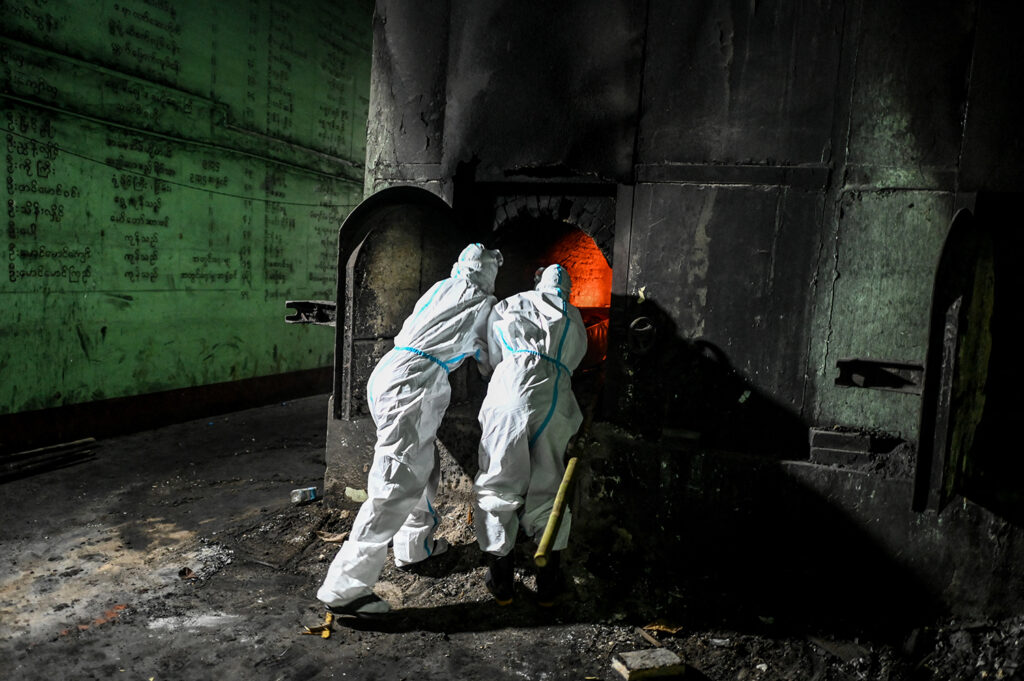
Ma Aye Thazin*, whose 68-year-old father succumbed to the virus in July 2021, told Frontier that the military must accept responsibility for the deaths of the elderly from COVID-19 and their families will never forget.
“My father refused to be vaccinated by the military and he always told me to never pay my utility bills. I admire him for making every effort to thwart the military takeover,” said Aye Thazin, who lives in downtown Yangon’s Lanmadaw Township.
The coup has also exposed a generational divide over the path Myanmar has taken since independence. Some among the younger generation have blamed their elders for the failure of previous uprisings against military rule, such as in 1988, and for allowing the military to consolidate power over previous decades.
Some youth joining the armed struggle have also had to overcome the fears of their parents, many of whom were traumatised by previous military crackdowns, and who had lived through periods of brutal dictatorship that differed from the pre-coup decade when these youth came of age.
U Than Myint*, 61, says he understands why his generation is being blamed and why the youth are so determined to fight. “Our time here is limited, but the young people are at the start of a new life,” said Than Myint, who lives in Yangon’s Mingalar Taung Nyunt Township.
“However, I want the younger generation to understand that allowing your children to join an armed revolution is the hardest thing a parent can do. We constantly worry about our kids,” he said.
His son, 28, and daughter, 23, are members of different armed resistance groups in Sagaing Region. Before the coup, his son was a communications officer for a non-government organisation in Yangon and his daughter was a university student.
“My wife died in 2020, so I only have my kids. I want to be with them, but I know it’s impossible. I’m always lonely, and I’m waiting for my kids to come home,” he said.
Before the coup, he received a monthly allowance of K300,000 from his son, but that ended when his son joined an armed resistance group. Now Than Myint is considering how best to support his children. This is a reversal of the norm in Myanmar where, thanks to meagre pensions and limited state support, younger people of working age are expected to financially support their parents as they grow old.
“I work as an advisor for a local marketing company. With a job, I can support my son and daughter each month,” he said, adding that, previously, “I hadn’t thought I’d have to support my children in my old age.” However, with his work contract expiring next month, he said he’s considering selling his apartment to keep aiding his children.
Many relatives of resistance fighters are similarly burdened by financial problems. Daw Cho*, 62, says she has had no regular income since her son joined a PDF in Mandalay Region. He had previously worked in marketing and sent her K130,000 every month.
“Now I’m staying with my younger sister’s family and she supports me a lot, but I need a job because I need money,” she said.
Economic decline since the coup, meanwhile, has impoverished the old regardless of whether their children have joined PDFs. In a report released last year, international NGO HelpAge International said that of the 200 elderly respondents, 73 percent had no income and 37pc said their biggest concern was about finances.
“The older people face reduced income, limited opportunities, and increased reliance on family members, neighbours, and communities,” the report said.
Daw Mar Lar Win, 68, who lives in Yangon’s western industrial suburb of Hlaing Tharyar, said her family has been struggling to make ends meet since the garment factory that employed her son and granddaughter closed down last month.
“I’m considering selling a gold necklace and ring,” Mar Lar Win said. “I worry about how we will go on living if the money runs out, but I’m hoping that my son and granddaughter will have new jobs before that happens.”
Suffering on the sidelines
With their children and grandchildren on the frontlines of an escalating civil war, many old people are having their worst fears realised.
For Daw May Win*, 65, whose son was shot dead last year by the military when he was fighting in Sagaing, the pain is unbearable.
“When she was told her son was killed, she lost consciousness and was admitted to hospital,” said her brother, who lives in Mandalay. Now the family is so afraid she may die of grief that they keep telling her that her son will return soon and encourage her to keep a healthy lifestyle, according to her brother.
An international organisation that asked not to be named said the coup and its violent aftermath have left many senior citizens wracked with anxiety and other mental health problems. “For this reason it is particularly important to provide support and resources to the elderly, including access to mental health services,” a spokesperson told Frontier.
Some older relatives of resistance fighters and activists have found it unbearable to remain on the sidelines, monitoring social media or junta-controlled state media for any reports of their loved ones being killed or arrested.
Daw Cho, the woman whose son joined a PDF in Mandalay Region, said she tried to accompany him to his base, but he refused to allow her.
“I’ve heard that the mothers or fathers of some PDF members are working as cooks,” she said. “Even though my son has not agreed, I have decided to go to him if the revolution does not succeed this year.”
*denotes use of a pseudonym for safety reasons


